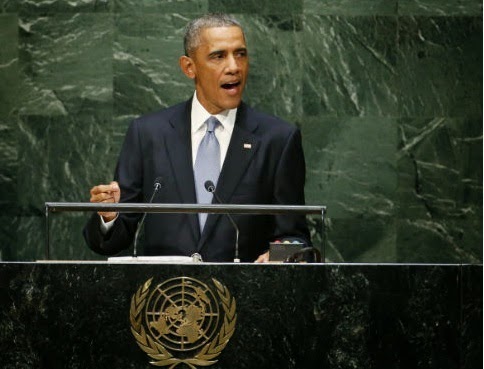Qualitative analysis of President Obama´s speech, given at the United
Nations on September 24th, has been performed using word count
statistics and my own bias as points of departure. Social psychology principles
allow qualitative analysis without statistical data. This includes observation
and interviews. Qualitative research should emphasize the analysis may not be
extended to a general population when the sample is small (Hsieh 2005).
Figure 1. President Obama at the UN on Sept 24, 2014.
The facial
expression and hand movements displayed a
typical homo sapiens “alpha male”
posture.
Content analysis of President Obama´s speech was carried out using WORDTM
software. This powerful tool allows the systematic analysis of political
speech. As Stemler wrote: “It also allows inferences to be made which can then
be corroborated using other methods of data collection. Krippendorff (1980)
notes that "[m]uch content analysis research is motivated by the search
for techniques to infer from symbolic data what would be either too costly, no
longer possible, or too obtrusive by the use of other techniques" (Stemler
2001).
The raw statistical analysis of the President´s speech yielded results
which confirmed the author´s previous bias. The speech mentioned America or
Americans 26 times. This was followed by the word “war” (24 times). Words
associated with the Middle East (Iraq, Syria, ISIL) merited 25 mentions, and
Israel/Israelis 6 mentions. On the other hand, Energy was mentioned twice, oil
wasn´t mentioned at all.
Figure 2. Word count of President Obama´s
speech with conceptually biased qualitative analysis
The Middle East is an intense
focus of US interest and the conventional wisdom relates this interest to oil (Pollack
2014). However, let´s look over the record:
“In spite of himself, U.S. President Dwight Eisenhower was sucked into
the Suez crisis in 1956 and the pan-Arabist revolts of the late 1950s. Lyndon Johnson barely lifted a finger to
prevent the Six-Day War in 1967. Richard Nixon found himself grudgingly
drawn into the region by the 1973 Arab-Israeli war and the superpower nuclear
crisis it caused. Despite his aggressive image, Ronald Reagan did little in
response to repeated attacks in Lebanon and the Persian Gulf by Iran and its
proxies.
George H. W. Bush came to office hoping to ignore Saddam Hussein, not
to go to war with him. And although it is rarely remembered today, George W.
Bush was not particularly interested in the Middle East and paid little
attention to the region prior to the 9/11 attacks.”(1)
The bold face statement “Lyndon Johnson barely lifted a finger to
prevent the Six-Day War in 1967” is a key to understanding what has happened. Unconditional
US support for Israel has emerged gradually over time. However, the Six Day war
resulted in Israeli control of the West Bank and Gaza, and turned what had been
a conflict between Israel and surrounding nations into a colonial war in which
Israel sought to subjugate a conquered population, while simultaneously
settling invaded territory with its own people (which happens to be a violation
of international law and gives enormous impetus to Palestinian resistance of
all types).
The war embarked the combatants on a new course which results in today´s intense
conflict. Israel knew its actions would
cause enormous push back by the conquered populations. This led it to (successfully)
intensify its lobby and propaganda efforts in the US, seeking political, economic and military
support as Israeli settlement policy
ignited resistance to its conquests (Findley 1985).
The Soviet Union´s collapse led to an “unipolar world” in which US
hegemony was unchallenged by major players (Russian Federation, China, India,
European Union, Arab League, and others).
Qualitative analysis of President Obama´s speech confirms the existing
biases: the US “imperial hegemon” can be described as a self-centered, warlike
and Middle East-focused power controlled by an oligarchy.
Figure 3. Final Consolidated Qualitative Analysis
shows the USA is a warlike
hegemon with a foreign
policy focused on
the Middle East, with low concern
for Ebola and almost none for Global Warming and
other regions.
The idea that US democracy has decayed in this fashion has been
expressed by numerous scholars. For example: “A new study that analyzes almost
2,000 government policy initiatives between 1981 and 2012 finds that the United
States may have become more of an oligarchy than a democracy.” (Rocha Menocal
2014) (2) .
The word count statistics confirm President Obama, being a polished
politician, knows how to touch upon “life quality” issues, such as the economy
and poverty, which merit 8 mentions. Given the events in Dallas, the President
will probably regret the low emphasis given to the Ebola epidemic and health in
general (5 mentions).
The bottom of the list includes Climate Change (2 mentions), while
India, China, and Latin America merited no mention at all.
Figure 4. BRICS leaders don´t really matter to the
USA, except Putin,
who hasn´t submitted.
Before the reader goes ballistic after reading this study´s conclusions,
consideration should be given to the
nature of qualitative analysis in the social sciences, which is rarely undertaken in a structured way.
A key assumption underpinning this
qualitative analysis is the extension of President Obama´s mental condition to
the broader US political elite and US population. This approach is copied from
Norgaard, Oreskes, and Lewandowski´s previous work. An alternative conclusion
would be that President Obama exhibited an isolated case of neo imperialist
ranting, which can be treaded using psychological methods and mood altering
drugs.
1Foreign Affairs article by Kenneth M. Pollack,
Director of Research, Saban Center for Middle East Policy, and Ray Takeyh,
Senior Fellow for Middle Eastern Studies
2 “History is not so Over” Foreign Policy article by
Alina Rocha Menocal, Research Fellow, Overseas Development Institute, London.
Other References





No hay comentarios:
Publicar un comentario